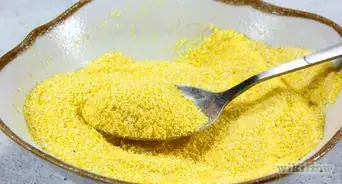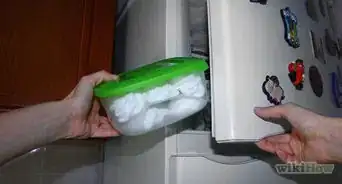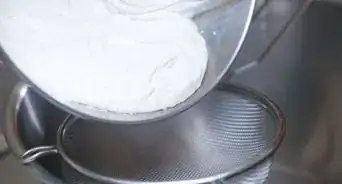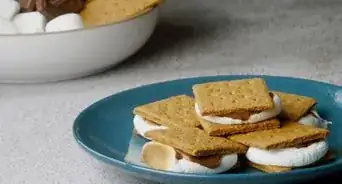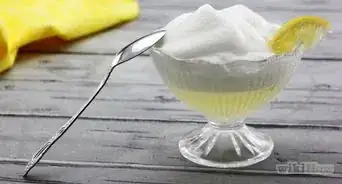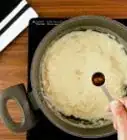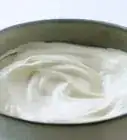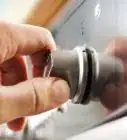This article was co-authored by wikiHow Staff. Our trained team of editors and researchers validate articles for accuracy and comprehensiveness. wikiHow's Content Management Team carefully monitors the work from our editorial staff to ensure that each article is backed by trusted research and meets our high quality standards.
There are 8 references cited in this article, which can be found at the bottom of the page.
The wikiHow Video Team also followed the article's instructions and verified that they work.
This article has been viewed 68,383 times.
Learn more...
Pavlova is a delightful, light and airy dessert. It has a meringue base and can be topped with whipped cream, custard, or fruit. When storing your pavlova, the most important thing is to keep it away from heat and moisture. The best way to store a pavlova is to put it in a dry, airtight container and keep it somewhere that is cool and dry.
Steps
Boxing or Wrapping the Pavlova
-
1Let your pavlova cool completely before taking it out of the oven. Once the pavlova has cooked completely, turn off your oven. Leave the pavlova in the oven for at least 2 hours.[1]
- You can also leave the pavlova in your oven overnight.
- Don’t be concerned if your pavlova has cracked. This is completely normal.
- Taking the pavlova out of the oven right away will subject it to a dramatic change in temperature, which may cause it to collapse.[2]
-
2Store your pavlova in a dry, airtight container. If your pavlova is left in the open, the sugar in the meringue will absorb moisture in your kitchen’s air. This added moisture will turn your crispy meringue into a soft and sticky mess. An airtight container will help shield your meringue from moisture in the air.[3]
- If possible, try to make pavlova on a dry day with low humidity to reduce the risk of moisture in the air softening your meringue.
- Avoid cooking other dishes or boiling water while you’re baking and cooling your pavlova. Doing so can add moisture to the air in your kitchen.[4]
Advertisement -
3Wrap your pavlova in cling film if you don’t have an airtight container. Wrap the pavlova lightly to avoid damaging its fragile shell. Make sure you cover the pavlova’s entire surface with cling film, so that no section is exposed.[5]
Storing the Pavlova in a Cool, Dry Place
-
1Keep your pavlova in a dry, cool place. Keep the airtight container with your pavlova on your counter, in a pantry, or in a cupboard where temperature and humidity are consistent. Make sure to keep your pavlova away from your stove and other sources of heat and moisture.[6]
- Take special care to keep your pavlova away from windows. Exposure to direct sunlight will ruin it.
- Your oven, when turned off and cool, is a good place to store your pavlova. Just don’t forget that you have it in there!
-
2Serve your pavlova within 2 days after making it. If you store your pavlova in an airtight container or wrap it well in cling film, it should keep its taste and texture for up to 2 days. The pavlova will taste best if eaten the day after you make it.[7]
- After you add fruit and whipped cream to your pavlova, you’ll need to eat it within a few hours.[8]
-
3Add toppings to your pavlova just before serving it. Adding custard, whipped cream, or fruit to the top of your pavlova will gradually dissolve its crispy outer shell. Leaving the toppings off until the last possible moment will allow the outer shell to keep its signature, and delicious, crispy texture.[9]
- After adding cream or custard toppings to your pavlova, it will keep its shape for only around 20 – 30 minutes.[10]
-
4Avoid refrigerating your pavlova to preserve its crispy texture. If you refrigerate your pavlova and then bring it out into room temperature, the pavlova will begin to sweat. This will soften the meringue shell and make it lose its shape.[11]
- While you should avoid keeping your pavlova in your refrigerator, storing it somewhere with a relatively cool air temperature will help preserve its crispy texture.
References
- ↑ https://nadialim.com/recipe/pavlova-wreath-lemon-curd-lychees/
- ↑ https://www.weeklytimesnow.com.au/country-living/food/jeremy-vincent-how-to-cook-pavlova/news-story/37bfe6e46fad739249ecbad5cba866e0
- ↑ https://www.sbs.com.au/food/article/2018/12/05/donna-hays-secrets-perfect-pavlova-every-time
- ↑ https://www.weeklytimesnow.com.au/country-living/food/jeremy-vincent-how-to-cook-pavlova/news-story/37bfe6e46fad739249ecbad5cba866e0
- ↑ https://nadialim.com/recipe/pavlova-wreath-lemon-curd-lychees/
- ↑ https://www.thekitchn.com/how-to-make-light-airy-pavlova-174407
- ↑ https://www.goodfood.com.au/recipes/how-to/how-to-make-the-perfect-pavlova-20130121-2d3g7
- ↑ https://www.thekitchn.com/how-to-make-light-airy-pavlova-174407
- ↑ https://www.sbs.com.au/food/article/2018/12/05/donna-hays-secrets-perfect-pavlova-every-time



